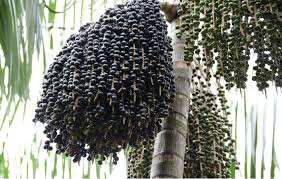
What Are Acai Berries?
Many of you have probably never heard of the Akai Berry, On Finca Florida of Ecuador we produce the berry in our Palm Zone.
Here is a bit of info on the berry and its benefits.
Acai berries are 1-inch (2.5-cm) round fruits that grow on acai palm trees in the rainforests of Central and South America. They have a dark purple skin and yellow flesh surrounding a large seed.
Because they contain pits like apricots and olives, they’re technically not a berry, but rather a drupe. Nevertheless, they’re commonly referred to as berries.
In the Amazon rainforest, acai berries frequently accompany meals.
To make them edible, they are soaked to soften the tough outer skin and then mashed to form a dark purple paste.
They have an earthy taste that’s often described as a cross between blackberries and unsweetened chocolate.
Fresh acai berries have a short shelf life and aren’t available outside of where they are grown. As an export, they are sold as a frozen fruit purée, dried powder or pressed juice.
Acai berries are also sometimes used to flavor food products, including jelly beans and ice cream, while some non-food items like body creams contain acai oil.
5 Impressive Health Benefits of Acai Berries

Acai berries contain many antioxidants, healthy fats, and fiber. Their nutritious composition makes them an excellent addition to a healthy diet.
Acai berries are a South American “superfruit.” They’re native to the Coastal and Amazon regions, where they’re a staple food.
However, they’ve recently gained popularity globally and are praised for being particularly beneficial to health and well-being.
This dark purple fruit certainly packs a lot of nutrition and may even have some health benefits, including the 5 described in this article.
SUMMARY:
Acai berries grow on acai palm trees in the Amazon rainforest. They’re processed into a pulp before eating.
1. They’re Nutrient-Dense
Acai berries have a unique nutritional profile for a fruit, as they’re somewhat high in fat and low in sugar.
100 grams of frozen fruit pulp has the following nutritional breakdown (1Trusted Source):
Calories: 70
Fat: 5 grams
Saturated fat: 1.5 grams
Carbs: 4 grams
Sugar: 2 grams
Fiber 2 grams
Vitamin A: 15% of the RDI
Calcium: 2% of the RDI
According to a Venezuelan study, acai berries also contain some other trace minerals, including chromium, zinc, iron, copper, manganese, magnesium, potassium and phosphorus (2Trusted Source).
But some of acai’s most powerful health benefits come from plant compounds.
The most notable one among these is anthocyanins, which give acai berries their deep purple color and act as antioxidants in the body.
You can also find anthocyanins in other blue, black and purple foods, such as black beans and blueberries.
SUMMARY:
Acai berries contain healthy fats and low amounts of sugar, as well as many trace minerals and plant compounds, including anthocyanins.
2. They’re Loaded With Antioxidants
 Antioxidants are important because they neutralize the damaging effects of free radicals throughout the body.
Antioxidants are important because they neutralize the damaging effects of free radicals throughout the body.
If free radicals are not neutralized by antioxidants, they can damage cells and lead to a number of diseases, including diabetes, cancer and heart disease.
Acai berries have an incredibly high amount of antioxidants, edging out other antioxidant-rich fruits like blueberries and cranberries.
The antioxidant content of foods is typically measured by an Oxygen Radical Absorbance Capacity (ORAC) score.
In the case of acai, 100 grams of frozen pulp has an ORAC of 15,405, whereas the same amount of blueberries has a score of 4,669.
This antioxidant activity comes from a number of plant compounds in acai, including anthocyanins.
In 2008, researchers gave 12 fasting volunteers acai pulp, acai juice, applesauce or a drink with no antioxidants at four different times and then tested their blood for antioxidants.
Both the acai pulp and applesauce raised participants’ antioxidant levels, which means that the antioxidant compounds in acai are well-absorbed in the gut.
It also indicates that acai pulp is a better source of antioxidants than acai juice.
SUMMARY:
Acai is incredibly rich in antioxidants, boasting three times the amount found in blueberries.
3. They May Improve Cholesterol Levels
Animal studies have suggested that acai could help improve cholesterol levels by decreasing total and LDL cholestero.
And it’s possible that it could have a similar effect in humans.
A 2011 study had 10 overweight adults eat acai smoothies twice daily for one month. Overall, they had lower total and “bad” LDL cholesterol at the end of the study.
However, there were a few drawbacks to this study. It was small, had no control group and received its funding from a primary supplier of acai.
While more research is needed, it’s possible that the anthocyanins in acai could be responsible for their positive impact on cholesterol levels, since studies have linked this plant compound to improvements in HDL and LDL cholesterol.
In addition, acai contains plant sterols, which prevent cholesterol from being absorbed by your body (10Trusted Source).
SUMMARY:
Many animal studies and at least one human study have suggested that acai may help lower blood cholesterol levels.
4. They May Have a Possible Anti-Cancer Effect
While no one food is a magic shield against cancer, some foods are known to stop cancer cells from forming and spreading.
Both test-tube and animal studies have revealed this sort of anti-cancer effect in acai.
In mice, acai pulp has reduced the incidence of colon and bladder cancer .
However, a second study in mice found that it had no effect on stomach cancer.
Researchers have concluded that acai could have a role in treating cancer in the future, yet more research is needed, including in humans.
SUMMARY:
In animal and test-tube studies, acai has shown potential as an anti-cancer agent. More studies are needed to determine its effect in humans.
5. They Could Boost Brain Function
The many plant compounds in acai could also protect your brain from damage as you age ).
Several studies have shown this kind of protective effect in lab rats
The antioxidants in acai counteract the damaging effects of inflammation and oxidation in brain cells, which can negatively affect memory and learning.
In one study, acai even helped improve memory in aging rats .
One of the ways in which the brain stays healthy is by cleaning up cells that are toxic or no longer working, a process known as autophagy. It makes way for new nerves to form, enhancing communication between brain cells.
As you age, this process works less efficiently. However, in lab tests, acai extract has helped stimulate this “housekeeping” response in brain cells.
SUMMARY: Acai may counteract the damaging effects of inflammation and oxidation in the brain and help stimulate its “housekeeping” response.
Possible Drawbacks to Acai Berries
Given that acai is a healthy, antioxidant-rich fruit, there aren’t a whole lot of drawbacks to eating it.
However, one word of caution is to not overestimate its associated health claims.


